SESSION #1
Responding to a Global Pandemic
Friday, September 17, 2021 | 8:30 am – 12:00 pm PT
QUICKLINKS:
Program Recordings
Opening Remarks: Series Introduction
Address from Rochelle Walensky, Director, CDC
PRESENTATION: A HISTORICAL PERSPECTIVE ON COVID-19
PANEL: THE U.S. RESPONSE
FIRESIDE CHAT: THE INTERNATIONAL RESPONSE
PANEL: HOW COVID-19 HAS RESHAPED THE U.S. AND GLOBAL ECONOMY
CLOSING REMARKS FROM THE DEANS
Overview
Virtual Event Program
Date | Friday, September 17, 2021
Time | 8:30 am – 12 pm PT
Opening Remarks: Series Introduction
8:30 – 8:40 am
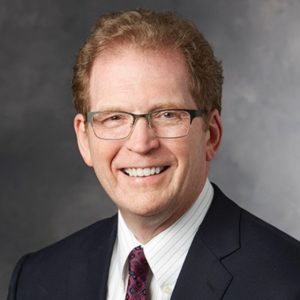
Lloyd Minor, MD
Dean, Stanford School of Medicine
Lloyd Minor is an academic leader, scientist, surgeon, and educator. Since 2012, he has been the Carl and Elizabeth Naumann Dean of the Stanford University School of Medicine. In this role he oversees the research, education, and clinical care strategies for Stanford Medicine, an academic medical center that includes the Stanford University School of Medicine, Stanford Health Care, and Stanford Children’s Health. Previously, he was the Provost and Senior Vice President for Academic Affairs of Johns Hopkins University. An expert on vestibular neurophysiology, Minor is known for identifying superior canal dehiscence syndrome and developing its surgical treatment. He is a member of the National Academy of Medicine and advises companies and investment firms such as aMoon, General Atlantic, and Mammoth Biosciences.
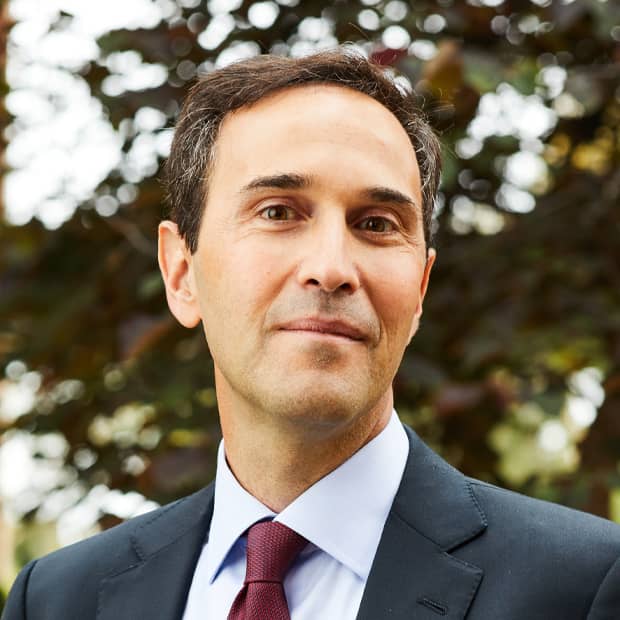
Jonathan Levin, PhD
Dean, Stanford Graduate School of Business
Jonathan Levin is the Philip H. Knight Professor and Dean of Stanford Graduate School of Business. He was appointed as the 10th dean of the school in September 2016. Levin joined the Stanford faculty as an assistant professor in 2000. He was later appointed the Holbrook Working Professor of Price Theory in the Department of Economics, and Department Chair from 2011 to 2014. He has taught market design, game theory, microeconomics, and industrial organization at the undergraduate and graduate levels. He was also professor, by courtesy, at the Stanford Graduate School of Business, a senior fellow at the Stanford Institute for Economic Policy Research, and director of the Industrial Organization Program at the National Bureau for Economic Research.
Address from Rochelle Walensky, Director, CDC
8:40 – 8:50 AM
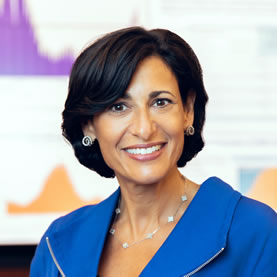
Rochelle Walensky, MD, MPH
Director
Centers for Disease Control and Prevention
PRESENTATION: A HISTORICAL PERSPECTIVE ON COVID-19
8:50 – 9:10 AM
The session’s opening presentation will place COVID-19 in the context of past pandemics, looking to history for insight into our present moment. John Barry—an author, historian, and expert on the 1918 Great Influenza—will draw parallels between past and present pandemic responses, illuminating lessons that can bolster our preparedness today and in the future.
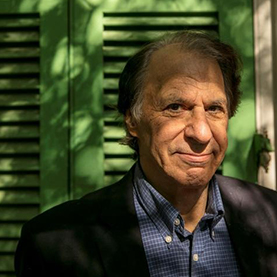
John Barry, Author
The Great Influenza
John Barry is a New York Times best-selling author, historian, and Distinguished Scholar at the Tulane School of Public Health and Tropical Medicine. The National Academies of Sciences named his 2004 book, “The Great Influenza: The Story of the Deadliest Pandemic in History,” a study of the 1918 pandemic, the year’s outstanding book on science or medicine. His earlier book, “Rising Tide: The Great Mississippi Flood of 1927 and How It Changed America,” won the Francis Parkman Prize of the Society of American Historians for the year’s best book on American history. He has advised various government entities on pandemic preparedness and response, and his articles have appeared in such scientific journals as Nature and The Journal of Infectious Diseases.
PANEL: THE U.S. RESPONSE
9:10 – 10:00 AM
COVID-19 has required all levels of government to collaborate and adapt in unprecedented ways. Public-private partnerships have also taken on new depth, proving instrumental to key initiatives ranging from surveillance testing to developing highly effective vaccines in record time. Despite these efforts, the U.S. has suffered high rates of infection, hospitalization, and death. This session will explore how the U.S. organized itself to combat COVID-19, strategies that were effective, and what could have been done differently thus far in the pandemic response.
Moderator
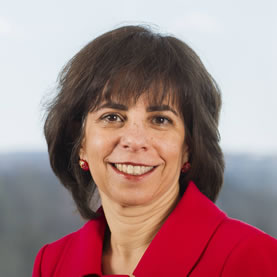
Joanne Kenen
Editor-At-Large, Health Care
Politico
Joanne Kenen is POLITICO’s Editor at Large for health care. Since arriving in Washington in 1994, she has focused on health policy and health politics. She joined POLITICO in September 2011 and led the health care team for nearly a decade, more than doubling its size as it covered everything from the Affordable Care Act to the pandemic. Previously she worked for Reuters in New York, Florida, the Caribbean, and Washington—mostly covering Congress. As a Kaiser Family Foundation media fellow in 2006-07, she wrote about aging and palliative care. Her work has appeared in numerous publications, including The Atlantic, Kaiser Health News, the Washingtonian, CQ, The Washington Post, the Center for Public Integrity, Health Affairs, National Journal, and Slate. In addition to her work on health policy, she has published two books and written extensively on parenting.
Panelists

Brad Smith
Former Deputy Director
Domestic Policy Council
Brad Smith is the Founder and Chief Executive Officer of Russell Street Ventures (RSV), a firm focused on launching and scaling health care companies that serve vulnerable patient populations. Prior to RSV, he served as Co-Founder and CEO of Aspire Health, which he grew into the nation’s largest home-based palliative care provider before its sale to Anthem in 2018. He has also served in key government roles, including Deputy Director of the White House Domestic Policy Council, Senior Advisor to the Secretary of the U.S. Department of Health and Human Services (HHS), Deputy Administrator at the Centers for Medicare and Medicaid Services (CMS), and Director of the Center for Medicare and Medicaid Innovation (CMMI). He supported the federal response to COVID-19 by helping to scale testing across the country and by launching Project Airbridge, which shipped billions of medical supplies from around the world to the U.S. He also served as a Board Member of Operation Warp Speed, helping develop COVID-19 vaccines in record time.
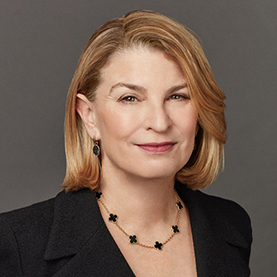
Sally Susman
Executive Vice President and
Chief Corporate Affairs Officer
Pfizer
As Executive Vice President and Chief Corporate Affairs Officer, Sally Susman leads engagement with all of Pfizer’s external stakeholders overseeing global policy, communications, government relations, corporate responsibility, investor relations, and the Chief Patient Office. She also serves as Vice Chair of The Pfizer Foundation. Before joining Pfizer in 2007, she held several senior communications and government relations roles at Estée Lauder Companies and the American Express Company, including a posting in London with responsibility for all of Europe. Earlier in her career, she spent eight years on Capitol Hill focused on international trade issues and was Deputy Assistant Secretary for Legislative Affairs in the Clinton Administration. Currently, she serves as Co-Chair of The International Rescue Committee, one of the world’s largest humanitarian aid organizations, and on the board of WPP, the U.K.-based global advertising and marketing company. She is also a member of the Council on Foreign Relations. She is a frequent commentator in newspapers, magazines, podcasts, and broadcast programs and was named a 2019 Top Voice on LinkedIn. She graduated from Connecticut College with a B.A. in government and studied at the London School of Economics.
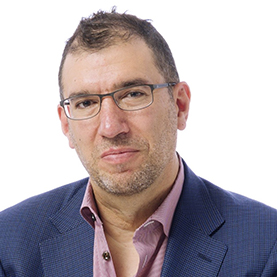
Andy Slavitt
Former Senior Advisor to the Biden Administration COVID Response,
Author of Preventable, General Partner of Town Hall Ventures, Host of "In the Bubble with Andy Slavitt"
Andy Slavitt was President Joe Biden’s White House Senior Advisor for the COVID-19 response. He has led many of the nation’s most important health care initiatives, serving as President Barack Obama’s head of Medicare and Medicaid and overseeing the turnaround, implementation and defense of the Affordable Care Act. Slavitt has served in leading private and nonprofit roles in addition to his government services. He is founder and Board Chair Emeritus of United States of Care, a national nonprofit health advocacy organization as well as a founding partner of Town Hall Ventures, a health care firm that invests in underrepresented communities. He co-chaired a national initiative on the future of health care at the Bipartisan Policy Center. Slavitt chronicles what goes on inside the government and across the nation at town halls, in USA Today, on his award-winning podcast, In the Bubble, and on Twitter. He is the author of “Preventable,” a best-selling account of the U.S.’s coronavirus response released in 2021. A graduate of the University of Pennsylvania and Harvard Business School, he and his wife have two grown sons.

Bonnie Maldonado, MD
Senior Associate Dean, Faculty Development and Diversity, Professor of Global Health and Infectious Diseases, Professor of Pediatrics (Infectious Diseases) and of Epidemiology and Population Health Stanford Medicine
Yvonne (Bonnie) Maldonado is Professor and Chief of the Division of Infectious Diseases, Department of Pediatrics and the Senior Associate Dean for Faculty Development and Diversity at the Stanford School of Medicine. Since the onset of the COVID-19 pandemic she has conducted more than 10 clinical, epidemiology and laboratory-based studies and is involved in epidemiologic modeling at the university, state, and national levels. She is the Chair of the American Academy of Pediatrics Committee on Infectious Diseases ,a member of the Infectious Diseases Society of America, the Society for Pediatric Research, the Pediatric Infectious Diseases Society, the Society for Healthcare Epidemiology of America, and the American Public Health Association. She is a member of the Board of the Pediatric Infectious Diseases Society, a liaison to the United States Public Health Service (USPHS) Advisory Committee on Immunization Practices (ACIP) and was previously a member of the Board of Scientific Counselors for the Office of Infectious Diseases at the Centers for Disease Control and Prevention.
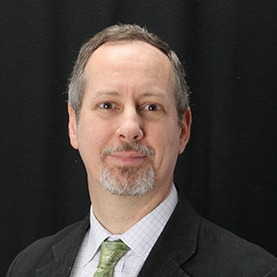
Alex Tabarrok, PhD
Professor of Economics
George Mason University
Alex Tabarrok is the Bartley J. Madden Chair in Economics at the Mercatus Center at George Mason University and a professor of economics at George Mason University. He is the co-founder of Marginal Revolution University, an online platform for learning economics, and is the co-author of the extensive website on FDA policies and reform, FDAReview.org. His research includes papers on the theory of voting, political economy, and empirical law and economics. He is the author and editor of a number of books and is widely published in peer-reviewed academic economics journals, as well as in the New York Times, Washington Post, Wall Street Journal, and elsewhere.
BREAK:
10:00 – 10:10 AM
FIRESIDE CHAT: THE INTERNATIONAL RESPONSE
10:10 – 11:00 AM
International coordination has been crucial in the fight against COVID-19. Global efforts to track cases, deliver resources, and develop vaccines have all depended on the cooperation of nations. But many would argue that these efforts have not gone far enough—especially as new COVID-19 variants take hold and threaten to undermine progress. This fireside chat with Soumya Swaminathan, MD, Chief Scientist of the World Health Organization, will offer a perspective on this topic, including why improving access to testing, equipment, and vaccines in the developing world is essential to our global success in ending the crisis.
Moderator
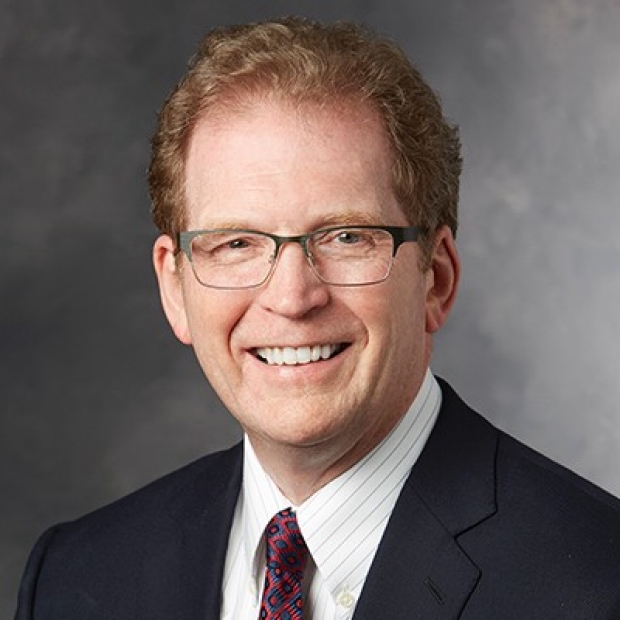
Lloyd Minor, MD
Dean, Stanford School of Medicine
Lloyd Minor is an academic leader, scientist, surgeon, and educator. Since 2012, he has been the Carl and Elizabeth Naumann Dean of the Stanford University School of Medicine. In this role he oversees the research, education, and clinical care strategies for Stanford Medicine, an academic medical center that includes the Stanford University School of Medicine, Stanford Health Care, and Stanford Children’s Health. Previously, he was the Provost and Senior Vice President for Academic Affairs of Johns Hopkins University. An expert on vestibular neurophysiology, Minor is known for identifying superior canal dehiscence syndrome and developing its surgical treatment. He is a member of the National Academy of Medicine and advises companies and investment firms such as aMoon, General Atlantic, and Mammoth Biosciences.
Speaker
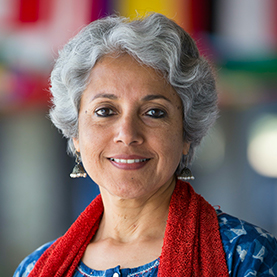
Soumya Swaminathan, MD
Chief Scientist
World Health Organization
Soumya Swaminathan was appointed WHO’s first Chief Scientist in March 2019. A pediatrician from India and a globally recognized researcher on tuberculosis and HIV, she brings with her 30 years of experience in clinical care and research and has worked throughout her career to translate research into impactful programs. She was Secretary to the Government of India for Health Research and Director General of the Indian Council of Medical Research from 2015 to 2017. From 2009 to 2011, she also served as Coordinator of the UNICEF/UNDP/World Bank/WHO Special Program for Research and Training in Tropical Diseases in Geneva. She received her academic training in India, the United Kingdom, and the United States, and has published more than 350 peer-reviewed publications and book chapters. She is an elected Foreign Fellow of the U.S. National Academy of Medicine and a fellow of all three science academies in India.
PANEL: HOW COVID-19 HAS RESHAPED THE U.S. AND GLOBAL ECONOMY
11:00 – 11:50 AM
The COVID-19 pandemic has left a lasting mark on our financial health, from global markets to American households. Governments have amassed trillions in debt while businesses have been shaken by lockdowns, supply chain disruptions, and large swings in consumer behavior. Moreover, U.S. households have endured a turbulent employment market and may soon see financial relief, debt forbearance, and other support dissipate. What are the risks and consequences of all this volatility? What key issues must policymakers focus on to guide an inclusive and robust recovery after COVID-19?
Moderator

Jonathan Levin, PhD
Dean, Stanford Graduate School of Business
Jonathan Levin is the Philip H. Knight Professor and Dean of Stanford Graduate School of Business. He was appointed as the 10th dean of the school in September 2016. Levin joined the Stanford faculty as an assistant professor in 2000. He was later appointed the Holbrook Working Professor of Price Theory in the Department of Economics, and Department Chair from 2011 to 2014. He has taught market design, game theory, microeconomics, and industrial organization at the undergraduate and graduate levels. He was also professor, by courtesy, at the Stanford Graduate School of Business, a senior fellow at the Stanford Institute for Economic Policy Research, and director of the Industrial Organization Program at the National Bureau for Economic Research.
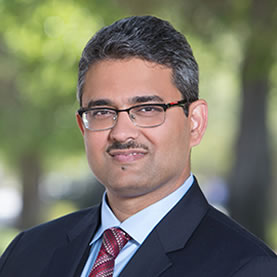
Amit Seru, PhD
Professor of Finance
Stanford Graduate School of Business
Amit Seru is the Steven and Roberta Denning Professor of Finance at the Stanford Graduate School of Business, a Senior Fellow at the Hoover Institution and Stanford Institute for Economic Policy Research (SIEPR), and a Research Associate at the National Bureau of Economic Research (NBER). He was formerly a faculty member at the University of Chicago’s Booth School of Business. His research focuses on corporate finance with an emphasis on financial intermediation and regulation, technological innovation and incentive provision, and financing in firms. His research in these areas has been published extensively in academic journals and he is currently a co-editor of the Journal of Finance.

Diedra Henry-Spires
Senior Advisor for COVID Programs
U.S. Small Business Administration
Diedra Henry-Spires serves as the Senior Advisor for COVID Programs to the Administrator at the U.S. Small Business Administration. In this role, she works to ensure the relief needed by small businesses across the country is made available and accessible. As a former member of the Committee’s Health Team, she is credited as one of the architects of the Affordable Care Act. She is also credited with shepherding the expansion of unemployment benefits and work supports during the great recession of 2008 and providing job creation policy and income security guidance and expertise for the American Recovery and Reinvestment Act of 2009 (ARRA), Jobs Creation Act of 2010, The American Taxpayer Relief Act of 2012, and The Middle-Class Tax Relief and Job Creation Act of 2012. Since leaving the Hill in 2014, she has served as the CEO of The Dalton Daley Group for Children and Families, a Maryland-based nonprofit. She is currently a lecturer in Public Policy and Health Policy for the University of Texas, Archer Center in Washington D.C.

Chad Jones, PhD
Professor of Economics
Stanford Graduate School of Business
Charles I. Jones is the STANCO 25 Professor of Economics at Stanford Graduate School of Business and a Research Associate of the National Bureau of Economic Research. He has been honored as a member of the American Academy of Arts and Sciences, a Fellow of the Econometric Society, and a co-editor of Econometrica. He is currently the Area Coordinator for the economics group at the GSB. He is the author of numerous research papers as well as two textbooks, Introduction to Economic Growth (2013) and Macroeconomics (2020).
CLOSING REMARKS FROM THE DEANS
11:50 – 12:00 PM